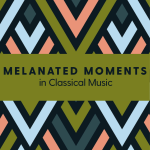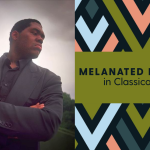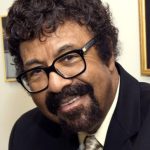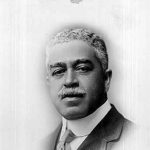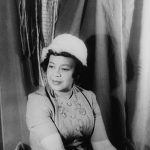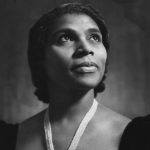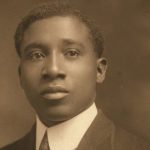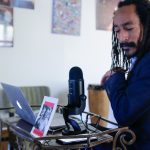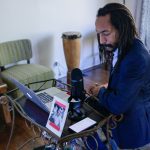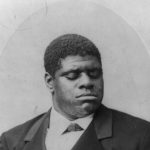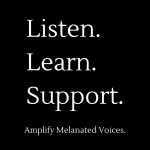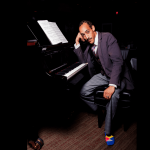Melanated Moments, Bonus Episode 2: Music in the Time of COVID
In this episode, Joshua and Angela speak with Dr. Bill Banfield about his personal experience with the COVID-19 virus and how it caused him to think deeply about the deep issues of our lives and the lives of those around us. They use Dr. Banfield’s 6th Symphony as a catalyst to explore how hard times like those we are experiencing often precede moments of hope and joy.
Featured Music:
“Symphony No. 6,” by William Banfield
Music Plays (00:05): [MMCM Theme] Joshua Thompson (00:15): Hello everyone. I’m Joshua Thompson… Angela Brown (00:17): And I’m Angela Brown. Joshua Thompson (00:19): And we’re here with our second bonus episode of Melanated Moments in Classical Music. As we look forward to season two, which will be out sometime in the summer of 2021. On our last episode, if you recall, we spoke with our amazing and prolific guests for these episodes, Dr. Bill Banfield, and we were focused on 2020 and the cultural through lines of music and how they can tie the struggles of the past with those of the president through the language of music. And if you’re talking about struggles in 2020, the big elephant in the room is the COVID-19 pandemic. Dr. Bill, you have quite a unique and intimate, almost a relationship with this pandemic. Isn’t that correct? Bill Banfield (01:07): Yeah. I mean, yeah, there’s the short end of that is: you’re right. I was affected– impacted by COVID in a very personal way because I caught this virus in New York, while I served as the chair of the Pulitzer Prize Committee this year. So I was responsible for helping to assemble with Columbia University– all the pieces– and then helping to draw some of the rules of order and that kind of thing. And then I was a judge this year. So I did all that this year. And the point of it is– with the COVID is– I traveled to New York at the beginning, when we didn’t know what was going on. Joshua Thompson (01:41): Well, because Dr. Bill, you and I had just– Angela Brown (01:42): Wow… Joshua Thompson (01:43): –parted ways, right. I was in Boston for a month. And on my way out, you also were on your way out to do this. Bill Banfield (01:50): I was– listen– and the date, Josh that’s February the 27th, 28th and 29th, and March 1st is when I did the judging of the Pulitzer Prize. And we didn’t know that it was– COVID was in the world. We’re just hearing about it on the news as we were doin’ our deliberations in the basement, sequestered to Columbia University. We weren’t even– you didn’t even know who we were. We were– we were in the basement. And you’re locked in there for four nights or whatever– or not locked in there– but you’re workin there. Then you go out on the streets and take a cab or take a train or go to the hotel, and guess what? Don’t you know, I stayed in a hotel that had a lot of people in it. And by the time I got home by March 1st, without knowing it, I had certainly contracted the COVID virus, unfortunately. So I was sick and I was intubated for almost three months. Angela Brown (02:44): Oh, no! Joshua Thompson (02:44): Three months? Yeah. Bill Banfield (02:44): I came very– excuse me, three weeks I actually. Yeah, it was, uh– I’m told I was on for 20 days, on a ventilator, which is a dangerous amount of time, but I was put to sleep. While COVID was being dealt with in my body, I was under on the– in ICU. It was very frightening for my wife and my family, as you can imagine. I lost the entire month of April actually, cause that was April the third they admitted me. And when they woke me up, it was April 23rd. Angela Brown (03:15): Oh wow. Oh my goodness. Bill Banfield (03:19): Very frightening for everyone. A lot of prayers going out and for weeks, people were praying for me. But I came through it and uh, and have been re-adjusting and rethinking all of these things that you all are talking about– about our notions of humanity and what our particular roles and passions in life are. And thank God–God brought me out. People pray for us, for me. I’m blessed and happy to be alive. Angela Brown (03:50): Yes, thank ya! Bill Banfield (03:50): Yeah. So I have had to think of a lot– I had to think a lot about our purposes, our meanings, our connections with each other. And so that has brought a lot of peace, speaking of peace! Joshua Thompson (04:02): There you go. [laughter] Bill Banfield (04:06): So there it is. There it is. Joshua Thompson (04:08): Yep. I’m sorry, Angela, go ‘head! Angela Brown (04:10): No, no. I was just gonna get ready to speak on the Symphony No. 6 piece. Bill Banfield (04:15): Yeah, yeah! Angela Brown (04:16): Because when I listened to that piece– because at the very beginning, like you said, when you hear that a little ‘brrdddddding!” I mean, it builds and it builds and it builds. And it’s like, to me, what I saw was like a roller coaster, and you’re going up in this rollercoaster and you don’t know what to expect. Isn’t that life? And you build and you go and you go, and then, just when you think you are about to die, fall off the cliff, something horrible is about to happen… The light of God picks you up and sends you soaring over effortlessly, where you can’t even dash your foot on a rock. That’s what this music felt like to me! So, Josh what do you think? Joshua Thompson (05:03): Yeah. You know, all of that, but Dr. Bill, I find with a lot of your works– because they do tend to dovetail into multi genre type things. Angela and I talk about using the American quilt, right? We use our entire palette as black musicians and composers. So you, you dance and you– and you compose within and outside of the genre. You remind me very much of William Grant Still– your textures, your colors, and the echoes of previous composers who have inspired you and–you recraft it and turn it into something new. Um, and I just think that is brilliant. Peace Symphony being a good example of that. And then also your Symphony No.6, to which I think we had– what is it– the Akron Symphony that you, um, you gave us, and they do a brilliant job of it. You hear all of those things, and, like we said earlier, rather than intellectualizing it, you just let the music do what it’s going to do and make those connections. Bill Banfield (06:02): Well, I think also, uh, I love what you said there about American quilt. It’s so easy to talk about music with the two of you, cause you all are so knowledgeable and sensitive on that. Listen, most folks don’t know what a composer is. They know what the arrangers are. They know what the producers are, ut when we think about composers, we think about European guys and ladies who lived and died a long time ago and live far off. But most people don’t really realize that the role of a composer still is alive today, and the American definition of that– to your point about American quilt– is being able to bring all these things. I mean, these are contemporary ladies. They’re writing songs and operas and jazz songs and symphonies and ballets. It’s not foreign music. It really is the music of our culture, which is global too– when you’re talking about, you know, the larger world. So I love the notion that: you talk about American quilt and– You’re helping our audiences understand textures, colors, melodies, because those are the things– Everybody sings a song [hums brief tune] “da-da, da, da-daaa, da”. Everybody gets what that is, and they know that “da-da, da-da, da” is a rhythm. So if you put rhythm together with a melody and you got a– you know– a sense of a purpose. That’s what the composers are trying to do. So you all are really helping us to see that and hear that. Thank you. Angela Brown (07:20): Well, let’s listen a little bit to Symphony No.6! Music Plays (07:26): [Bill Banfield, “Symphony No. 6”] Angela Brown (14:17): You see what I’m talking about, how it just builds, builds, builds, and then you just feel the white light of God holding you! [dramatic sigh] I’m so philosophical now, but– Joshua Thompson (14:35): Well, listen that’s what– Angela Brown (14:35): –2020’ll do it to ya! Bill Banfield (14:36): But interesting enough, you know, you are — Angela, you bring up some important points, both of you do. One of the things is they kind of ends on what we call, you know, the Heaven Chord, or God chord– it’s just a C major chord. I did the other thing the same way. I end It in a court, You know, with this idea of peace. And those are two things that are very similar. So people can say, “well it’s the same”– It’s not the same piece. They’re actually separated by 25 years, but some of the tricks and the things that we do as composers– We continue to do those things with our music. So we’re always, you know, aware of the things that we use. We just use them in different ways. So you helped us to bring out which was very cool. I mean, I love what Josh said about a quilt. This is– one of the quilts in American music is jazz. And this tune is called Four Songs for Five American Voices, and this movement is called “Sara”. So, I mean– there you go! And then the one other thing I was saying– and I know we got a lot to talk about– is, guess what? I wrote this song for Angela then, but I turned it into this 25 years later! Isn’t that something, Josh? Joshua Thompson (15:48): Absolutely remarkable! And the reuse of these things is what I find absolutely fascinating. And I think this provides a wonderful place to end today’s episode: where we’ve really been able to reflect on the– just the incredible scope of this pandemic, and how it has deeply affected, not just our personal lives, but the lives of literally everyone around the globe, and how music can be the panacea for these feelings of hurt and struggle. But looking forward to the next episode, we’re going to explore the other half of the coin in these experiences, for these musicians and composers, which is to highlight and show the resilience, maybe the joy and the perseverance that comes out of these hardships. So on that note, I’m Joshua Thompson… Angela Brown (16:40): And I’m Angela Brown! Joshua Thompson (16:42): And this has been Melanated Moments in Classical Music. Joshua Thompson (16:52): Hello everyone, I’m Joshua Thompson…. Angela Brown (16:54): And I’m Angela Brown! Joshua Thompson (16:56): And this is Melanated Moments in Classical Music– Angela Brown (17:00): Thank You Edition! Joshua Thompson (17:02): As hosts of Melanated Moments in Classical Music, we wanted to take a moment to thank the Central Indiana Community Foundation, — Angela Brown (17:10): The Board of Directors of Indianapolis Foundation, and– Joshua Thompson (17:14): The Evans Woollen Fund for Fine Arts for supporting Season Two of our podcast. Angela Brown (17:20): We can’t wait to bring you Season Two as part of Classical Music Indy’s Amplify Our Voices Initiative. Joshua Thompson (17:28): And as always, we look forward to shining a bright spotlight on musical works composed by, for, and about Black people. We truly, and sincerely thank you for your generous support.
[/su_tab] [su_tab title=”Related Blog Posts” disabled=”no” anchor=”” url=”” target=”blank” class=””]LOCAL CLASSICAL – MELANATED MOMENTS SEASON SIX
As we continue celebrating Black Music Month, this week’s playlist will feature music and artists discussed during the latest season of Melanated Moments in Classical Music. All of season six was recently released and featured vibrant discussions about artists such as Scott Joplin, Hazel Scott, Joseph Bologne, and Kenneth Overton, among others.
LOCAL CLASSICAL – BLACK MUSIC MONTH
In this week’s playlist, we celebrate Black Music Month which takes place in June. It was created by President Jimmy Carter in 1979 to honor and celebrate Black artists’ contributions to music. We’ll be honoring the late Herman Whitfield III, an Indianapolis native who was a gifted pianist and composer. We’ll also hear performances of artists who have been featured in season four of Classical Music Indy’s podcast, Melanated Moments in Classical Music.
LOCAL CLASSICAL – MELANATED MOMENTS
In this week’s Black History Month playlist, we bring you recordings by composers, performers, and artists who have been highlighted in our podcast, Melanated Moments in Classical Music. Melanated Moments is the ward-winning podcast from Classical Music Indy that shines a spotlight on musical works composed by, for, and about Black people.
LOCAL CLASSICAL – HOST OKARA IMANI
Hey, Starshine! This is Okara Imani, Media Production Fellow for Classical Music Indy, and your guide to The “I” in Classical Music. I’m here to highlight the cultural and social intersections of the classical art form, beyond the Classical Period and beyond the constructs of Euro-centric high society origins.
Ric’key Pageot: Inspiring a Moment to Learn, Acknowledge, and Respect
Ric’key Pageot: Inspiring a Mo …
Ignatius Sancho: Composing the Hypocrisy of Colonialism & Convention
Ignatius Sancho: Composing the …
NEW CLASSICAL – DR. BILL BANFIELD
This week we bring you the music of Dr. Bill Banfield. Dr. Banfield is an award-winning composer whose symphonies, operas, chamber works have been performed and recorded by major symphonies across the country. Few have a wider, performed professional composing output, that has had public concert performances, reviews, radio, recordings of some 12 symphonies, 7 opera, 9 concerti, chamber, jazz, and popular forms. This alone making Dr. Banfield one of the most performed, recorded composers of his generation. In 2010 and 2016, Dr. Banfield served as a Pulitzer Prize judge in American music.
#AmplifyMelanatedVoices
Classical Music Indy stands with our Black community. We are here to listen, learn, and lend our support. We believe that classical music is powerful; that it evokes a range of human emotions and creative expression.
Angela Brown Brings her Unbridled Zeal to a New Podcast.
Angela Brown brings her unbrid …



